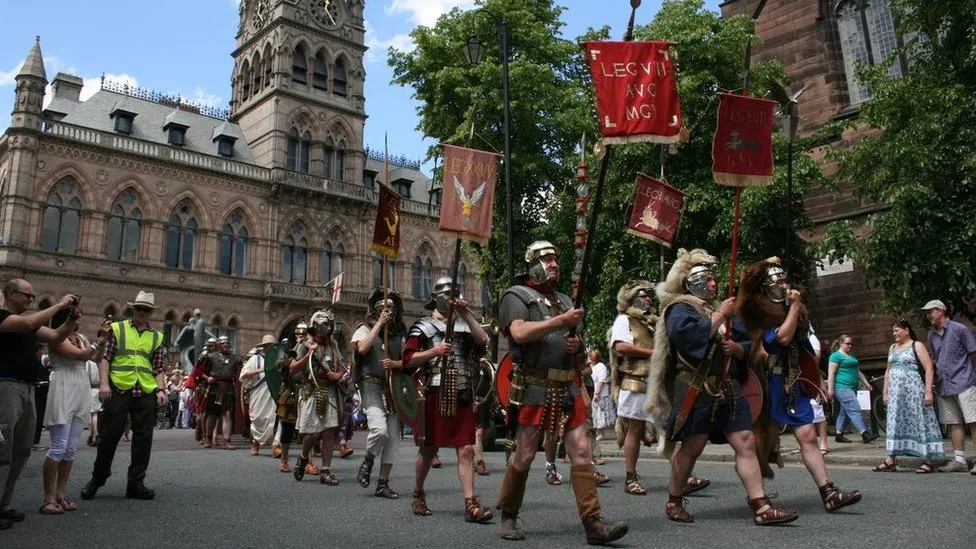
December brings festivities to many of England's cities, but for one, it is a chance to rejoice in more than one set of 2,000-year-old celebrations.
Every year, a week or so before Christmas, Chester's streets are filled with the same sights, sounds and smells that have marked Saturnalia in the city since its days as the Roman city of Deva Victrix.
The festival, which English Heritage (EH) said honoured Saturn, the Roman god of farming and harvest, was one of the ancient empire's most popular celebrations.
EH said it was originally a single-day event on 17 December, but its popularity saw the festivities stretch over time and eventually last until 23 December.
The organisation said Romans usually adhered to "very strict societal rules, and everyone knew their place", but during Saturnalia, the rules were "set aside, and even slaves, who had hard lives with little time off, could relax and have fun".
It saw gift-giving and excessive eating and drinking, traditions that continued when it was replaced by Christmas after the fall of the Roman Empire, but in Chester, which was once Rome's largest fortress in Britain, more of it has survived into modern times.
Roman Tours manager Cellan Harston, who helps put on the city's Saturnalia parade, said it was important to "reflect Chester's history".
"Chester is well known for its Roman heritage and local people are very proud of that heritage," he said.
However, he said keeping the Roman celebration alive was about more than just history.
He said Saturnalia "was a chance to release chaos on the world" and the modern procession, held as part of the city's Winter Watch parade, was a "spectacle that represents that chaos".
Chester West and Chester councillor Lisa Denson said the procession, which will pass the city's Roman amphitheatre, sees an official ceremony that includes the lighting of torches and the handing out of "gifts of light".
She said it was a chance to relive Chester's past while also looking to its future.
"Chester is a Roman city and Saturnalia offers the opportunity to combine the modern-day Christmas celebrations with an acknowledgement to our Roman history," she said.
"Roman soldiers marching through the city centre always attracts the crowds, [who enjoy it when] the soldiers light their flaming torches and share the light by handing out glow sticks."
Dr Caroline Pudney, a senior archaeology lecturer at the University of Chester, said keeping Saturnalia alive in the city was about "maintaining a sense of tradition and bringing the past to life".
She said the historic festival was "a time of merriment, with people engaging in activities such as feasting, gambling, and exchanging small gifts" and its traditions, which would have been celebrated by the members of the 20th Legion, are echoed in today's Christmas festivities.
"Soldiers here in Chester would likely have honoured the Saturnalia and particularly welcomed the fact that it would have afforded them some days off," she said.
"The festival also involved the decoration of homes with greenery, such as wreaths and branches, and the lighting of candles and Saturnalia finished with the Sigillaria, a day of present giving, a bit like Christmas Day."
However, she added that the modern Saturnalia proceedings were not quite the same as the Roman ones, as Chester now celebrated "in a way that combines the Roman festival with the vibrant tradition of the city's medieval parades and processions".
But one moment does link it intrinsically to Rome, as the parade always begins with an actor voicing the words of Domitian, who was emperor when Deva Victrix was founded.
"Let none of you be mistaken, the Romans are still here, at certain times of the year you will see us marching once more through our fortress," he tells the crowd.
"Remember who and what I am.
"I am a sword that sings in the dark. I am the sound of a legion marching to war.
"I am the axe that thuds into your skull. I am accuser, judge and executioner.
"I am Imperator. I am a living god. I am Caesar. I am Rome."
The Saturnalia parade takes place in Chester at 18:00 GMT on 14 December.